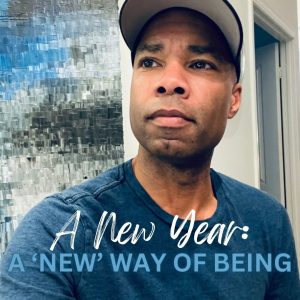
Towards the end of November 2023, and as the year began to wind down, something became crystal clear to me: I was wasting a lot of time. I was too often reaching for my phone. I tried to do things—write, organize my expenses, bake/cook, read—while surfing the internet or streaming a movie or show on Prime Video. These were bad habits that I knew would impact my ability to do deep work, yet it became harder and harder to stop them. That led to another realization: I needed a ‘new’ way of being.
Stepping Back, Stepping Forward
I’d fallen down the rabbit hole of social media and other technology apps. Despite knowing better, I couldn’t stop myself from reaching for my phone. I knew that to do deep work, especially writing, I couldn’t be distracted. Yet there I was, unable—or unwilling?—to disconnect. Something would pop into my head and I’d immediately Google the answer. Or I’d stream a movie or show (that I’d watched for the umpteenth time) in the background.
If I’m reading and I have something streaming in the background (music or a show), the odds are high I’ll miss a key concept or have to reread a sentence multiple times. When writing, distractions often cause me to lose my train of thought, realizing just how incoherent the ideas are when I later undertake the rewrite. Or when baking or cooking, letting myself be distracted can lead to inadvertently omitting a key ingredient. It’s clear that I’m not all in on the task.
In his book, Deep Work: Rules for Focused Success in a Distracted World, Cal Newport advises that “to produce at your peak level you need to work for extended periods with full concentration on a single task free from distraction.”1 I know from experience that when I focus singly on one task, it’s not only easier to produce at my peak level but I also enter that flow state, accomplish what I set out to do, and feel good about it. But when it becomes difficult, near impossible, to disconnect, something’s gotta give.
Breaking the Cycle
 I’m a big advocate of routine. Over the years, routine not only helped me write books or train for marathons…it also kept me grounded. But when bad habits develop and displace good ones, there’s a sequential, and negative, impact on routine. The routine, now comprised of bad habits, takes you away from what matters. That was what happened to me. It translated into a lack of progress on my writing projects and an increase in screen time. Combined with a lack of quality sleep, it triggered feelings of laziness (I’m not good enough), inertia (just do something, anything!), and despondency (what’s the point?).
I’m a big advocate of routine. Over the years, routine not only helped me write books or train for marathons…it also kept me grounded. But when bad habits develop and displace good ones, there’s a sequential, and negative, impact on routine. The routine, now comprised of bad habits, takes you away from what matters. That was what happened to me. It translated into a lack of progress on my writing projects and an increase in screen time. Combined with a lack of quality sleep, it triggered feelings of laziness (I’m not good enough), inertia (just do something, anything!), and despondency (what’s the point?).
The clock was ticking on 2023, and if I wanted to stop wasting time and focus on my goals, I needed a ‘new’ way of being. How could I detach from all the distractions clamouring for my attention and winning it? How ruthless did I need to be? I found the answer in advice from Arnold Schwarzenegger who, in his book, Be Useful: Seven Tools for Life, writes “to do great things that last, sacrifices are necessary.”2
Breaking the cycle to embrace a ‘new’ way of being meant prepping myself for a little pain.
The Art of Letting Go
If I continued down that path, I risked losing what remained of the year to my phone and other distractions. It’s true, we all have the same twenty-four hours in a day. What differs is how we spend them. For me, after accounting for the time I spend at work, commuting, in bed (‘sleeping’), and prepping for work, I have used up roughly eighteen and a half hours (on a good day when everything goes according to plan). The five and a half hours that are left are all I have to write, read, research, exercise, go to appointments, and run errands (if necessary).
Five and a half hours can seem like a lot of time, or a little, depending on your perspective. However, if I’m distracted or exhausted, it’s easy to squander that time. I don’t want my phone, or any other distractions, holding me hostage. For that reason, it became essential for me to embrace a ‘new’ way of being to stave off those feelings of laziness, inertia, and despondency. It meant a return to the way things were.
A Return to Digital Minimalism
In the early part of 2022, I listened to a School of Greatness episode where Lewis Howes interviewed Cal Newport. Intrigued by the concept of digital minimalism and deep work, I began to explore them. And in August 2022, I came up with six rules that I hoped would help me become a digital minimalist.
For the time that I embrace digital minimalism, my productivity soared and my screen time dramatically decreased. It was because I understood, and was willing to implement and stick to, a philosophy of technology use: “[…] focus your online time on a small number of carefully selected and optimized activities that strongly support things you value, and then happily miss out on everything else.”3
To get where I want to go, that ‘philosophy of technology use’ must again become my ‘new’ way of being.
A ‘New’ Way of Being
This time around, my approach to not wasting time and staying focused on the things I value requires setting three (not six) rules for myself:
- Do not pick up my phone during the first hour of the day
- Restrict streaming services during my morning creative time (I recently cancelled, again, my Amazon Prime subscription, which included Prime Video)
- Embrace solitude
Embracing this ‘new’ way of being is as much about not wasting time as it is about cultivating a life of minimal regrets. Because I have a vision for my life, and it doesn’t include scrolling away the days—or my life—on social media, binge-watching TV, or obsessively checking news sites.
A ‘new’ way of being will (this is my ardent prayer) quiet the noise and let my most authentic self shine.
Leave a Reply